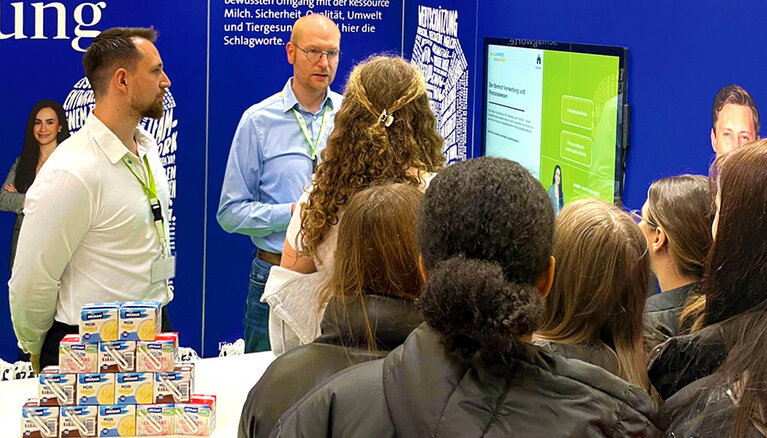
“At job fairs, we at DMK always get a good sense of what teenagers today are interested in. Often, they have some prejudices when they come to our stand. They imagine that dairy farming is really old-fashioned, they think all farms are involved in factory farming and that the industry is all about the past, not the future. But on the other hand, they often tend to have a romantic image of farmers driving tractors across fields at sunrise, in an idealized world.
When we start talking, they are often amazed by how mistaken they are. They don’t realize how a modern dairy cooperative focuses on the zeitgeist in all areas of business. We really spend a lot of time thinking about trends: vegan food, product diversity, brand extensions. They often don’t know that DMK works abroad and that the processes from farm to factory are largely digital and hightech. That there is a whole range of jobs from farmer to milk technologist to product developer, and that the milk that DMK farmers provide goes into making the grated cheese that tops their favorite pizza.
Every teenager is different – and the teens of today are no better or worse than those of yesterday. It is just that they live in different worlds. These days, you even find introverts on Instagram and TikTok, who are active on social media and have learned to respond fast. Generally, they have a more comprehensive stance on things: they want to live more sustainably and are mindful of themselves. They have a clear take on political issues and are much more confident about that than their parents were at their age. Nevertheless, just like teenagers 30 years ago, they are riven with insecurities, fears and questions. Their personalities are not yet fully developed and they are searching. They worry about not fitting in, or being excluded from a community, and are sensitive to criticism at this stage.
Our generation grew up believing that we had to stand in line. You were one applicant among many, and companies weren’t coming out looking for you. You had to have the right grades, you had to put up with the hierarchical environment and show respect and humility to your boss. These days, there is a shortage of skilled workers and companies are actively applying to the trainees. Today, a manager is a coach, not a boss. You have mentoring programs to promote the individual. You want staff to stay and to be happy about that. Young people these days may be freer as a result, but they also have to be much more active, quicker and more present than ever before, as they are expected to take part in decisions, fuel and accelerate developments and innovations. They have more responsibility right from the start, but mostly that is something they see as a challenge and an incentive.
As a company, this is something we must respond to. Applicants who don’t initially appear to be a good fit as they have a D in math are not necessarily unsuitable for a job where you need some knowledge of science. Personality is enormously important these days. Trainers must learn to listen to applicants even more carefully. Who is this person I am dealing with? What are their hobbies, the interests and skills that I can’t see on their CV? That soon leads you to discussing life beyond education. How do you rate yourself? What would your brother or sister say about you? That shows the candidate is self-redlective, that they want more and are eager to learn. That they will compensate for any lack of scientific knowledge themselves as long as they find their new job meaningful. You can see all this during the interview. Then we figure out together where we can best put the candidate.

And how do you keep hold of these young people? By responding to their need for community, by providing a social environment, cultural openness, diversity, the opportunity for self-development, and flexible working hours. These are just a few key points. Teenagers – and any other worker for that matter – want someone who can guide them through their careers as an equal. Not someone who talks down to them. Not a boss but a coach.”


